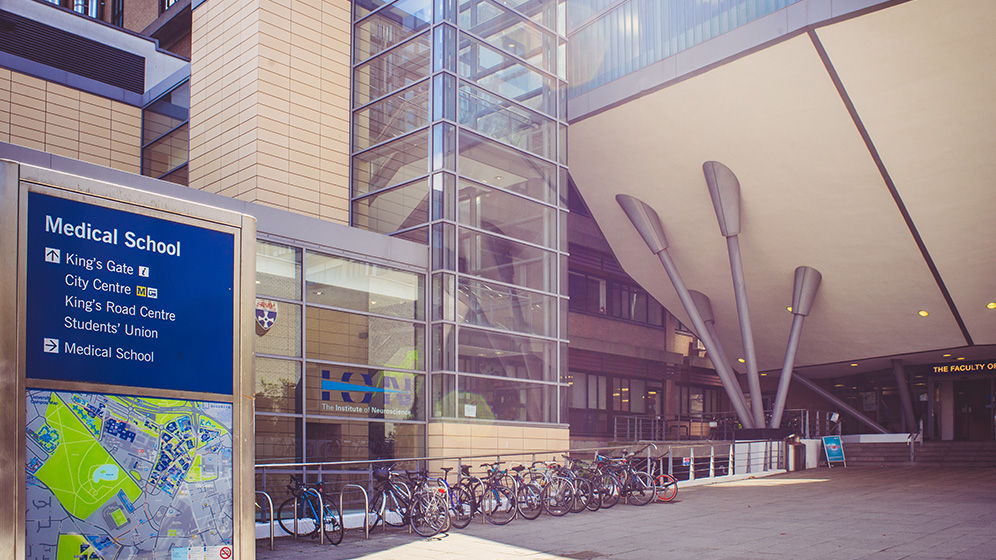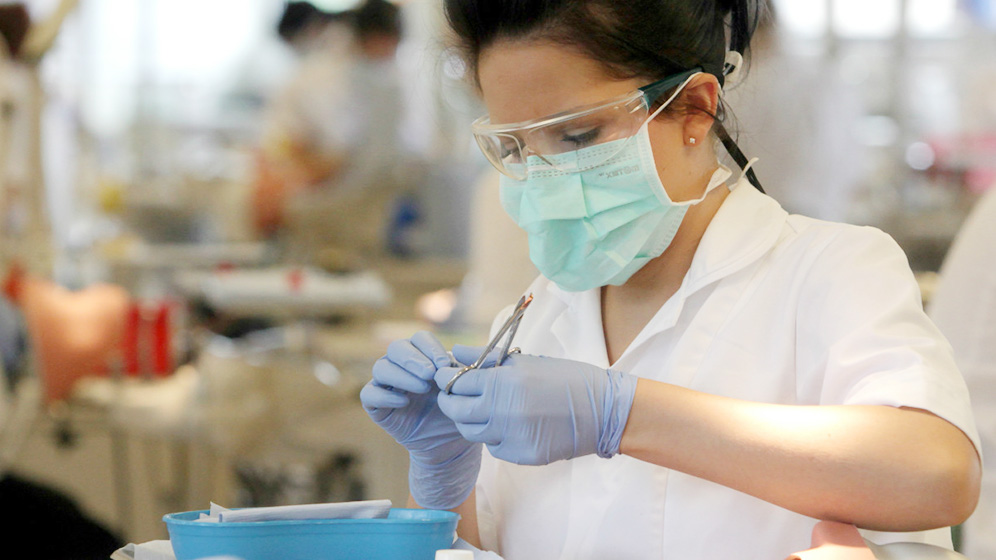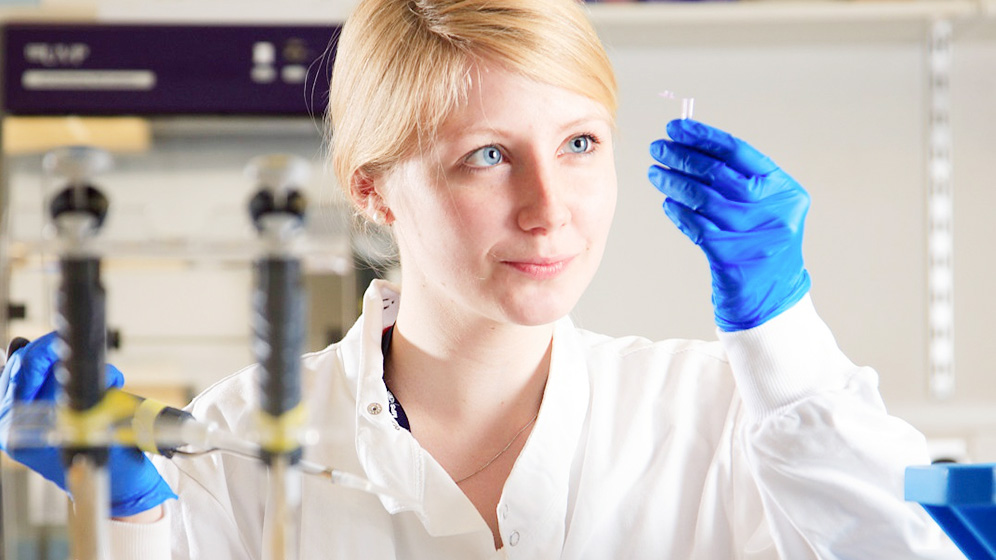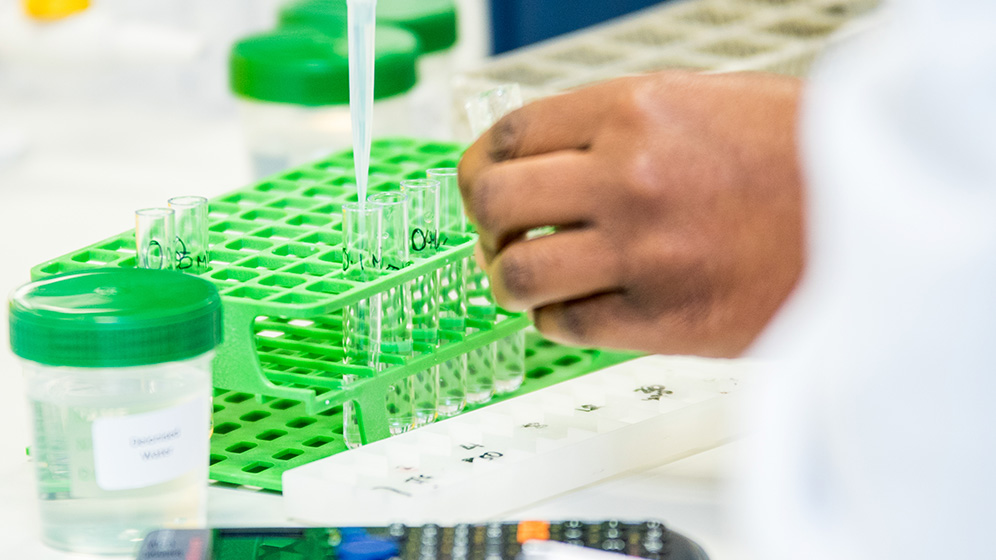Medicine and Surgery MB BS
- UCAS code: A100
- Full time
- 5 years
This highly regarded medical programme will prepare you for a career as a compassionate and skilled practitioner - able to provide safe, individualised care based on a sound knowledge of health, disease and society.
You are currently viewing course information for entry year: 2026
Next start date:
- September 2026
UCAS Institution name and code:
- NEWC / N21
Course overview
Our MB BS programme uses a modern and innovative integrated case-led teaching approach, and you'll be taught in a vibrant learning environment.
This course will prepare you to work as a doctor anywhere in the world, in both the clinical and academic arena.
Programme structure
Years 1 and 2
In Years 1 and 2 you'll study key subject areas including medical sciences, clinical skills, ethics and professionalism. You'll be based primarily on campus in Newcastle with frequent visits to hospitals and general practices around the regional medical school. You'll cover a series of twenty-four clinical cases to put your learning into context and provide you with the essentials of medical practice.
Years 3 to 5
In years 3 to 5 you'll gain clinical experience through placements in our clinical base units across the region. You'll undergo a series of rotations, clerkships, assistantships and placements that cover all relevant areas of medicine and surgery. We'll place further emphasis on professional development, student choice, and hospital- and community-based medicine. This develops your specialist knowledge, skills and professional behaviour, preparing you for your future career as a doctor.
Throughout the final three years of the programme, there will be opportunities for student choice. This includes two four-week student selected components and an eight-week elective.
Teaching methods
At Newcastle you'll receive case-led teaching, which means using clinical cases to help you make the links between your new knowledge and clinical practice. For example a case of stroke can be used to learn and teach the nervous system, cardiovascular system, clinical skills, pharmacology, Public Health and communication skills.
Elective placement
At the end of Year 4 you undertake an eight-week elective placement. This gives you the opportunity to study medicine, either at home or abroad and gain hands-on experience of a different healthcare system.
Skills and experience
Research skills
We’re a Centre of Excellence in translational (so-called ‘bench-to-bedside’) research.
This means teaching on our programme is research led. Strong links with our research teams mean there are many opportunities for students to spend time in research labs and facilities as part of short projects or as part of intercalation onto a master's degree.
Professional skills
To prepare you for your future profession we'll help you develop the key skills of communication, information handling, reasoning, judgement, reflective practice and decision-making.
You will be prepared for ongoing professional development and, through this, you will be able to adapt to future developments in medicine.
Clinical skills
With our integrated case led teaching approach you will meet patients and learn the relevant clinical skills from the very beginning of our programme. Our regional medical school provides cutting-edge teaching facilities combined with a diverse population and environment for you to develop into a doctor of the future.
READ MORE
Your course and study experience - disclaimers and terms and conditions
Please rest assured we make all reasonable efforts to provide you with the programmes, services and facilities described. However, it may be necessary to make changes due to significant disruption, for example in response to Covid-19.
View our Academic experience page, which gives information about your Newcastle University study experience for the academic year 2025-26.
See our terms and conditions and student complaints information, which gives details of circumstances that may lead to changes to programmes, modules or University services.
Quality and ranking
Professional accreditation and recognition
All professional accreditations are reviewed regularly by their professional body.
Opportunities
Malaysia exchange
During Year 2 there is an opportunity to spend a semester at our branch campus in Malaysia.
Intercalated study
Our medical students have the opportunity to enrich their personal and professional development further by taking time out of their medical studies to pursue an intercalated degree.
Intercalation provides an opportunity to study a subject that interests and excites you as well as develop new perspectives on healthcare delivery, research and education.
We offer a broad range of Biomedical Science BSc degrees and Masters degrees that cover all aspects of medical practice.
We encourage you to develop skills that will be useful throughout your future career and offer options to undertake your own research project.
Newcastle is recognised as a leader in a number of areas of research including ageing research and applied stem cell biology.
We also have state-of-the-art facilities for clinical research, developed in partnership with NHS trusts.
Students who do not wish to take an additional year of study will still have opportunities to benefit from our research expertise through Student-Selected Components (SSCs) and the summer research scholarship scheme.
Facilities and environment
Facilities
Our School is part of the Faculty of Medical Sciences, which is home to Dentistry, Biomedical Sciences, Psychology and Pharmacy, encouraging inter-professional collaboration.
Our Medical School is a Regional Medical School and has partnerships with the Northern Region NHS. It gives you access to excellent clinical training opportunities offered by the large patient population (3.5 million) and the region-wide infrastructure of acute hospitals and general practices.
By training in one of the largest integrated teaching and hospital complexes in the country you'll gain a true insight into your future profession.
You'll have access to:
- an extensive specialist medical library
- a Clinical Skills and Anatomy Laboratory
- dedicated computer clusters with online study guides that include interactive assessment tools
- Anatomy and Clinical Skills Centres, in Newcastle and throughout the region, which include patient simulators, dissecting rooms and clinical skills laboratories
Support
To help support your transition to university life, we offer a peer-mentoring scheme that partners all new students with a student from Year 2.
From the beginning of your first year you will be allocated an academic mentor who will support you throughout the programme.
Your future
After completing your University programme, you're currently eligible to apply for provisional registration with the General Medical Council GMC with a licence to practise, subject to demonstrating to the GMC that your fitness to practise is not impaired. However, the GMC are currently reviewing legislation and you should be aware this may be different in the future.
Currently, all UK medical graduates are required to complete a two-year Foundation Programme of general clinical training.
The majority of our students decide to apply to Foundation posts within the region. There are sufficient Foundation Programme places in the Northern Region for the majority of medical graduates.
International students are currently permitted to undertake the full Foundation Programme, ie the first two years following graduation, but you are normally required to return to your home country to complete further speciality training.
Once you have successfully completed the first year of the two year National Foundation Programme (FY1) and gained the certificate of experience you should gain full registration with the GMC. See GMC registration and National Examinations for further details. This is followed by a further year of generic training (F2). On successful completion of your second year, all doctors will have achieved the same basic competencies before going on to select their specialty of choice, either as a doctor in a hospital or as a GP.
All doctors, regardless of their speciality, must continue learning throughout their career, and our programme has been designed with this long-term aim in mind.
Find out more about the career options for Medicine and Surgery from Prospects: The UK's Official Career Website. There is also helpful information available regarding careers in medicine and surgery within the North East.
Make a difference
Sorry, you need JavaScript to view this video
Careers support
We provide specialist careers advice from undergraduate level through to foundation training, to help you move confidently from student to doctor.
Our Careers Service is one of the largest and best in the country, and we have strong links with employers. We provide an extensive range of opportunities to all students through our ncl+ initiative.
Visit our Careers Service website
Recognition of professional qualifications outside of the UK
If you’re studying an accredited degree and thinking about working in Europe after you graduate, the best place to find current information is the UK Government’s guidance on recognition of UK professional qualifications in EU member states. This official resource explains whether your profession is regulated in another country, what steps you need to take, and which organisation you should contact.
Additional information
Medical Licensing Agreement
The General Medical Council (GMC) has introduced a Medical Licensing Assessment (MLA) which will set a common threshold for safe practice. Doctors who wish to work in the UK will need to show that they meet that threshold before the GMC grants a licence to practise.
To register with a licence to practise, all students graduating from the academic year 2024-25 onwards from UK medical schools will need to have passed a medical degree programme that includes the MLA.
The Medical Licensing Assessment (MLA) will be a two-part assessment in the form of:
• an Applied Knowledge Test (AKT). This test will be the same for all UK students and international medical graduates. A GMC-appointed exam board will set each paper and the pass standard. For UK medical students, schools will set test dates. We will provide the test paper, to be delivered at the school. We will also deliver the test for international medical graduates. We'll do this at a number of locations worldwide, possibly using delivery partners. The intention is that this will be a computer-based test
• a Clinical and Professional Skills Assessment (CPSA). For UK medical students, universities already run assessments of clinical and professional skills. We will set requirements that these assessments need to meet. If the medical school's clinical assessment meets those requirements, students who pass it will have passed the CPSA element of the MLA.
NUMed Malaysia
Newcastle University has an overseas campus in Malaysia.
International students who are interested in studying at NUMed can visit NUMed Malaysia's website for more information.
The NUMed Malaysia MB BS undergraduate programme is equivalent to that delivered in the UK. It leads to the award of a Newcastle University MB BS (Bachelor of Medical Sciences) degree. The programme comes under the UK's General Medical Council's (GMC) robust approval and quality assurance framework.
Newcastle is the first UK university to develop an overseas campus offering full UK medical degrees in-country.
Entry requirements
All candidates are considered on an individual basis and we accept a broad range of qualifications.
The entrance requirements and offers below apply to 2026 entry.
| A-Level | |
|---|---|
| International Baccalaureate | |
|---|---|
Other UK and the Republic of Ireland qualifications
Alternative offers at Newcastle
Through one of our contextual or alternative offer routes, you could receive an offer of up to three grades lower than the typical requirements.
Contextual offers
We use certain contextual data from your UCAS form, alongside your application, to consider challenges that you may have faced in your education and the potential effect this may have had on your qualifications. This means you may be eligible to receive a lower contextual offer.
PARTNERS offers
One of the largest and longest support entry routes to university of its kind for students from underrepresented backgrounds. We support applicants from application through to study.
Realising Opportunities offers
A unique programme delivered in collaboration with 10 leading, research-intensive universities in the UK. The programme is open to students in Year 12/first year of college.
Pathways to Newcastle offers
Pathways to Newcastle, our national skills entry route, is available for specific subject areas.
High Performance Athletes
We support promising athletes at the application stage, who compete in regional, national or international levels in their sport.
Qualifications from outside the UK
English Language requirements
Entrance courses (INTO)
International Pathway courses are specialist programmes designed for international students who want to study in the UK. We provide a range of study options for international students in partnership with INTO.
These courses are specifically designed for international students who want to study in the UK and progress onto one of our undergraduate degrees. Our International Study Centre, has a range of study options including:
- International Foundation
- International Year One
- English Language courses
Find out more about International Pathway courses
Admissions policy
This policy applies to all undergraduate and postgraduate admissions at Newcastle University. It is intended to provide information about our admissions policies and procedures to applicants and potential applicants, to their advisors and family members, and to staff of the University.
University Admissions Policy and related policies and procedures
Credit transfer and Recognition of Prior Learning
Recognition of Prior Learning (RPL) can allow you to convert existing relevant university-level knowledge, skills and experience into credits towards a qualification. Find out more about the RPL policy which may apply to this course.
School of Medicine Admissions Policy
Please download and read the School of Medicine Admissions Policy 2026 (PDF: 723.5) to find out more about:
- health assessment and disclosure
- Disclosure and Barring Service (DBS) checks
- other academic achievements and admissions criteria
University Clinical Aptitude Test (UCAT)
All applicants applying to study the 5 year A100 programme or the 4 year A101 Medicine programme at Newcastle University will be required to take the University Clinical Aptitude Test (UCAT).
The UCAT threshold may differ in each admissions cycle as it is dependent on the scores achieved by those applicants who apply to our Medical School in the current cycle.
For further information:
- download the UCAT Thresholds 2025 (PDF: 90KB) and application numbers for previous years
- see the School of Medicine website for more information
Age Requirements
Tuition fees and scholarships
Tuition fees for academic year 2026-2027
The 2026 entry home fees have not yet been confirmed.
| Qualification: MB BS | |
|---|---|
|
Home students full time 5 years |
Tuition fees (Year 1)
Not set |
|
International students full time 5 years |
Tuition fees (Year 1)
47,000 |
Year abroad and additional costs
For programmes where you can spend a year on a work placement or studying abroad, you will receive a significant fee reduction for that year.
Some of our degrees involve additional costs which are not covered by your tuition fees.
Scholarships
Find out more about:
Open days and events
You'll have a number of opportunities to meet us throughout the year at our on-campus and virtual open days.
You'll be able to:
- explore our beautiful campus
- find out about our vibrant city
- discover what students think about studying at Newcastle
You'll also have the opportunity to speak to academic staff and find out more about the subjects you're interested in.
Find out about how you can visit Newcastle in person and virtually.
We regularly travel overseas to meet with students interested in studying at Newcastle University. Visit our events calendar to find out when we're visiting your region.
Applying to Medicine at Newcastle University
Find out how to apply as a home applicant.
Find out how to apply as an international applicant.
How to apply
Apply through UCAS
To apply for undergraduate study at Newcastle University, you must use the online application system managed by the Universities and Colleges Admissions Service (UCAS). All UK schools and colleges, and a small number of EU and international establishments, are registered with UCAS. You will need:
- the UCAS name and institution codes for Newcastle University (NEWC/N21)
- the UCAS code for the course you want to apply for
- the UCAS 'buzzword' for your school or college
If you are applying independently, or are applying from a school or college which is not registered to manage applications, you will still use the Apply system. You will not need a buzzword.
Apply through UCASApply through an agent
International students often apply to us through an agent. Have a look at our recommended agents and get in touch with them.
UCAS admissions procedure for medicine programmes
Please note:
- you may apply for Year 1 entry to Newcastle University
- you are permitted a maximum of four choices on the UCAS application form for medicine
- the closing date for applications is 15 October 2025
Get in touch
By phone
Call us on +44 (0) 191 208 3333 and press option 1. Our opening hours are Monday to Friday 10am until 4pm.
Live chat
Our NCL chatbot might be able to give you an answer straight away. If not, it’ll direct you to someone who can help.
You'll find our NCL chatbot in the bottom right of this page.
Online
Keep updated
We regularly send email updates and extra information about the University.
Receive regular updates by email


